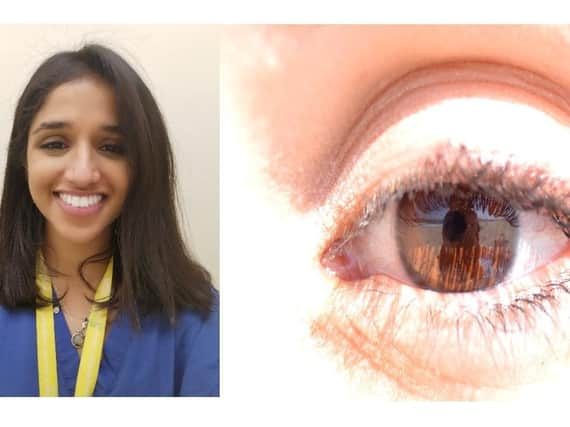How to take care of your eyes during lockdown...advice from expert at Northampton General Hospital


With the country in its third national lockdown, social distancing measures are still, maybe even more so now, pertinent to reduce the transmission of the coronavirus.
All fields of Medicine have had to adjust and adapt quickly to a significant shift of the most common presenting diseases at a hospital. Some are either a direct, or an indirect consequence of the current social distancing measures.
Advertisement
Hide AdAdvertisement
Hide AdIn regards to eye conditions, many scientific studies have been carried out to understand this transition in ophthalmology.
A recent study1 published in the European Journal of Ophthalmology performed in Leicester, compared the most frequent ocular emergencies seen in 2019 and in 2020 during the first lockdown period. It reported the top 4 eye emergencies seen during lockdown as: (1) trauma to the eye; (2) inflammation of the cornea (the most outer see-through layer of the eye); (3) uveitis (inflammation of the middle layer of the eye) and (4) dry eyes syndrome.
Curiously, conjunctivitis, which was the most commonly seen condition in 2019, ranked only 6th during the first wave of lockdown. This is most likely related to the current measures, i.e. washing hands more frequently and correctly will reduce transmission viral and bacterial conjunctivitis. On the other hand, staying home for more hours may increase the risk for other eye conditions.
Firstly, as people spend more time at home, they will look for more activities to keep themselves busy. Amongst the most popular ones are gardening (although less likely now during winter) cooking, and do-it-yourself (DIY) projects. Using new tools, chemicals or working with metal or wood can easily lead to eye injuries if no ocular protection is utilised. Therefore, it is essential that one uses adequate protective goggles – especially when i.e. drilling, sawing or using chemicals.
Advertisement
Hide AdAdvertisement
Hide AdSecondly, the pandemic has forced most of us to work from home. Most work will be computer based, meaning more time looking at screens. This can make your eyes dry, cause blurred vision and even headaches. Hence, it is crucial to rest your sight regularly – a simple rule to follow is the 20-20-20 rule, take a 20-second break from looking at a screen every 20 minutes and look 20 feet away.
Thirdly, we are now probably all aware how to clean our hands properly. But for people using contact lenses a reminder is to do this before inserting and removing them. This will help prevent any infection to the eye. And, whilst on this subject, make sure to change your contact lenses solution frequently and avoid showering with or using them whilst sleeping. This is very common reason for severe eye infections that can lead to blindness!
Finally, make sure your diet is healthy and that you are active (within social measure rules, of course) – this will contribute to a healthy eye as well as your general wellbeing, especially if you have conditions such as diabetes, high blood pressure and high cholesterol, which also affect your eye.
If there are still any concerns regarding any eye problems you should seek immediate advice from your optician or physician to tackle any issue in an adequate time-frame.